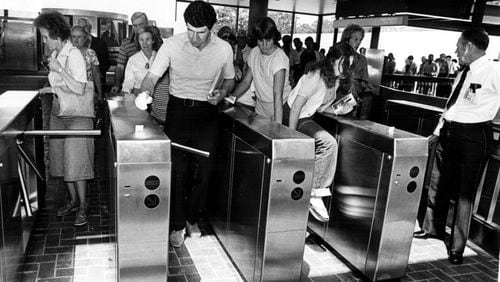A Seattle TV station just did a big takeout on how Atlantans in 1968 voted to approve a sales tax to fund MARTA and got $900 million as a federal match.
That money could just as easily have gone to Seattle, the story said, which had also been seeking a federal match to start a subway. (Incidentally, $900 million back then is equivalent to more than $5 billion in 2015 dollars). But Seattle voters rejected the regional bonds necessary to fund its rail plan.
Fast forward four decades or so, and Atlanta has a system that transports nearly a quarter million riders every day and they don't. Not only that, MARTA generates at least $2.6 billion annually in economic activity and supports roughly 24,000 jobs statewide, according to a 2013 study by University of Georgia's Carl Vinson Institute.
There's another way to look at this scenario. Atlanta has already lost out on federal dollars by failing to lay the groundwork for intercity rail back when the Obama administration was handing out stimulus money.
Atlanta also missed the boat in the early 1990s, when the Federal Railroad Administration had money set aside to encourage the development of intermodal stations (transportation hubs that marry bus, intercity rail and commuter rail service). About 130 cities applied for the grants; Atlanta didn't.
As a result, plans for "The Gulch," a dilapidated area of downtown Atlanta where a multi-modal station has long been envisioned, still sit idle.
Will Atlanta catch the next train toward future transit development, so-to-speak?
We'll find out soon enough. MARTA wants to lobby the state Legislature in 2016 to allow voters in the counties it serves to approve an additional half-penny sales tax that could fund $4 billion in improvements. Transit agency board chairman Robbie Ashe has said that money could be leveraged to get a federal match of another $4 billion.
That amount of money would be enough to expand heavy rail north to Windward Parkway in Alpharetta, east to Stonecrest Mall and to install a light rail tram system to connect the Lindbergh and Avondale MARTA stations through the busy CDC-Emory-Decatur corridor. It might even be enough to help fund a light-rail system along the Beltline, Ashe said.
Or, that money could jump-start another city's transit boon. Some metro Atlantans would prefer it that way. They point out rightly that the federal money doesn't come free - local taxpayers to pony up a sizable chunk. They think investment in transit is a black hole, and that pouring more money into it is throwing good money after bad.
They might be right. But ask Seattle how well spurning transit worked out for them. Or better yet, let's look at what the Seattle story concluded:
But the man who runs MARTA believes Seattle is doing the right thing by expanding light rail and upping bus service, instead of mourning what it missed.
"Get past that," said (MARTA CEO) Keith Parker, "start planning today for the next 20, 30, 40 years and you'll get there. I don't think it's ever too late to make the right choice."






